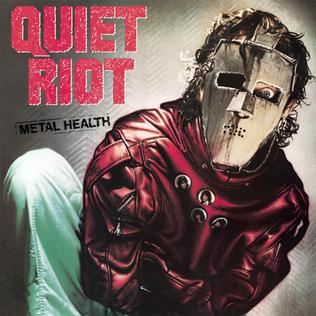
Metal Health is the third studio album by the American heavy metal band Quiet Riot, released on March 11, 1983. The album spawned the hit singles "Cum On Feel the Noize" and "Metal Health". It was the band's first album to receive a worldwide release, as the first two were released only in Japan.

QR III is the fifth studio album released by American Hard rock/heavy metal band Quiet Riot. It was released in 1986 on Pasha / CBS. It is the last album to feature lead singer Kevin DuBrow until the 1993 album Terrified.
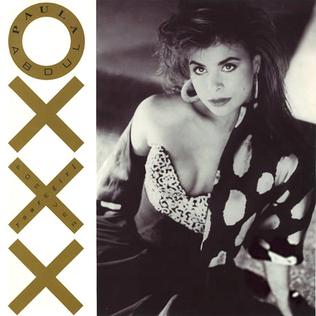
"Forever Your Girl" is a song by American singer Paula Abdul from her debut studio album, Forever Your Girl (1988). The song was written and produced by Oliver Leiber, with additional production by Keith "K.C." Cohen. Virgin Records released it as the album's fourth single on February 20, 1989.
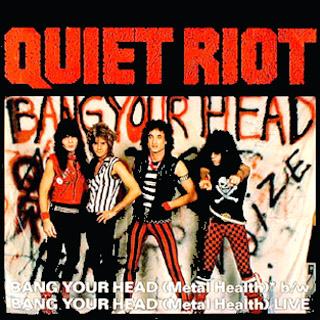
"Metal Health", sometimes listed as "Metal Health (Bang Your Head)", "Bang Your Head" or, as it was listed on the Billboard Hot 100, "Bang Your Head (Metal Health)", is a song by the American heavy metal band Quiet Riot on their breakthrough album, Metal Health. One of their best known hits and receiving heavy MTV music video and radio play, "Metal Health" was the band's second and final top 40 hit, peaking at #31 on the Billboard Hot 100.
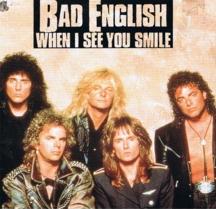
"When I See You Smile" is a song written by Diane Warren and performed by American-British glam metal band Bad English. It was released in September 1989 as the second single taken from their self-titled debut album released in 1989. The power ballad is the band's most successful song, reaching number-one in both the United States and Canada.

"Nobody" is a song by American singer-songwriter Keith Sweat featuring Athena Cage from the band Kut Klose. The song spent three weeks at No. 1 on the US Billboard Hot R&B Singles chart and reached No. 3 on the Billboard Hot 100. Internationally, it reached No. 9 in New Zealand, No. 10 in the Netherlands, No. 16 in Canada, and No. 22 in Australia. The music video for the single features a young Mekhi Phifer.

"Wild, Wild West" is a song by British pop rock band the Escape Club from their debut studio album, Wild Wild West (1988). The single reached No. 1 on the US Billboard Hot 100 the week of 12 November 1988, making the Escape Club the only British artist to have a No. 1 hit in the United States while never charting in the UK.

"No More 'I Love You's'" is a song written by British musicians David Freeman and Joseph Hughes and recorded by them as the Lover Speaks. It was released in June 1986 as the lead single from their self-titled debut album. The song was covered by the Scottish singer Annie Lennox and became a commercial success for her in 1995, reaching number two on the UK Singles Chart.
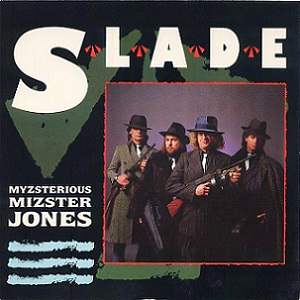
"Myzsterious Mizster Jones" is a song by English rock band Slade, released in 1985 as the third single from their twelfth studio album, Rogues Gallery. The song was written by lead vocalist Noddy Holder and bassist Jim Lea, and was produced by John Punter. "Myzsterious Mizster Jones" reached number 50 in the UK Singles Chart and remained in the top 100 for five weeks.

"Little Sheila" is a song by English rock band Slade, released in 1985 as the fourth and final single from the band's twelfth studio album, Rogues Gallery. The song was written by lead vocalist Noddy Holder and bassist Jim Lea, and was produced by John Punter.

"7 Year Bitch" is a song by English rock band Slade, released in 1985 as the second single from their twelfth studio album, Rogues Gallery. The song was written by lead vocalist Noddy Holder and bassist Jim Lea, and was produced by John Punter. It reached number 60 in the UK Singles Chart and remained in the top 100 for three weeks.

"Heartbeat Like a Drum" is a song by English new wave band A Flock of Seagulls, released by Jive in 1986 as the second and final single from their fourth studio album Dream Come True. The song was written by Mike Score, Ali Score and Frank Maudsley, and produced by Mike Score and Wayne Brathwaite.

"True" is a song from American alternative rock band Concrete Blonde, which was released in 1987 as the second single from their debut studio album Concrete Blonde (1986). The song was written by Johnette Napolitano and James Mankey, and produced by Earle Mankey and Concrete Blonde. The song reached number 42 on the US Billboard Album Rock Tracks chart.
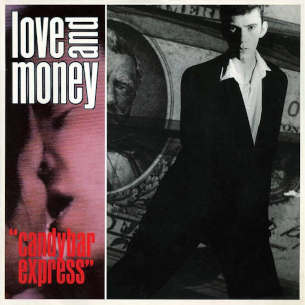
"Candybar Express" is a song by Scottish band Love and Money, which was released in 1986 as the debut single from their debut studio album All You Need Is.... The song was written by James Grant and produced by Andy Taylor. "Candybar Express" reached number 56 in the UK Singles Chart and number 10 on the Billboard Hot Dance/Disco Club Play chart.

"Shame" is a song by American new wave band The Motels, which was released in 1985 as the lead single from their fifth studio album Shock. The song was written by Martha Davis and produced by Richie Zito. "Shame" peaked at number 21 on the US Billboard Hot 100.

"Remember the Nights" is a song by American new wave band The Motels, which was released in 1983 as the second single from their fourth studio album Little Robbers. The song was written by Martha Davis and Scott Thurston, and produced by Val Garay. "Remember the Nights" peaked at number 36 on the US Billboard Hot 100.

"Shock" is a song by American new wave band The Motels, which was released in 1985 as the second single from their fifth studio album Shock. The song was written by Martha Davis and Scott Thurston, and produced by Richie Zito. "Shock" peaked at number 84 on the US Billboard Hot 100.

"Shadows of Love" is a song by new wave duo Wax, released by RCA in 1986 as the third single from their debut studio album Magnetic Heaven. The song was written by band members Andrew Gold and Graham Gouldman, and produced by Phil Thornalley.

"Two Hearts" is a song by English singer and musician John Parr, released in 1986 as a single from the soundtrack of the 1986 American sports drama film American Anthem. The song, written and produced by Parr, was also included on Parr's second studio album Running the Endless Mile (1986).

"Hanging on a Heart Attack" is a song by American pop rock band Device, released in 1986 as the lead single from their only studio album 22B3. The song was written by Holly Knight and Mike Chapman, and was produced by Chapman. "Hanging on a Heart Attack" peaked at number 35 on the US Billboard Hot 100.




















